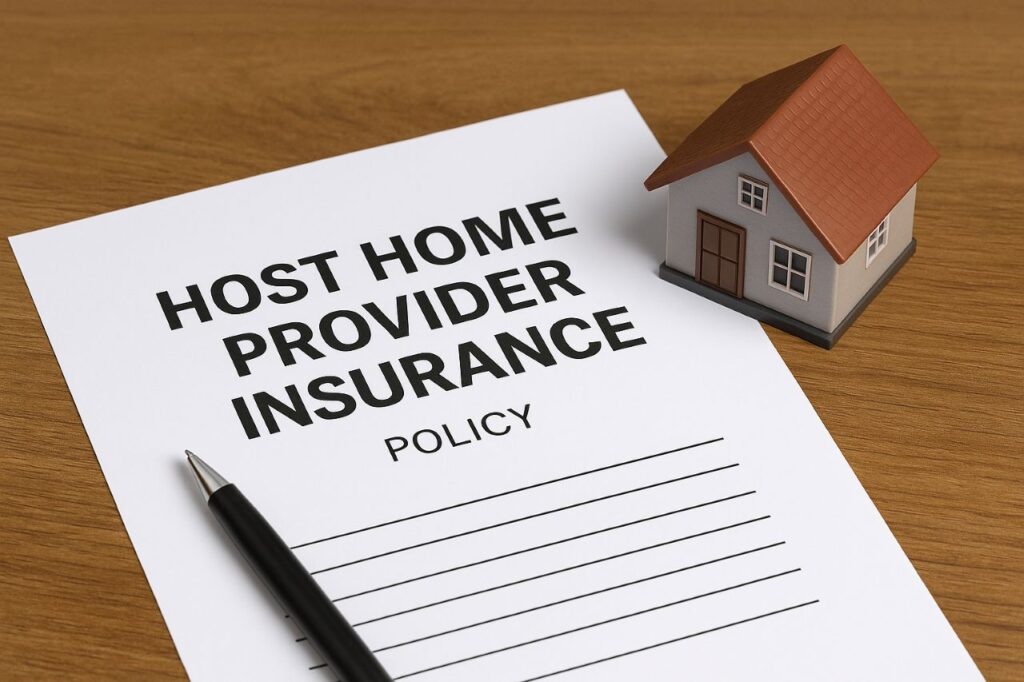Host Home Provider Insurance: 7 Powerful Reasons
Host home provider insurance is critical for the person or family providing care to disabled adults within a home environment. It safeguards against special risks that are not covered by normal homeowners insurance. Such specialized protection secures the caregiver and resident.
Selecting the proper host home provider insurance assists in managing risks such as accidents, injuries, or damage to property. Most agencies demand this insurance for the purpose of licensing and compliance. It is a vital factor in providing a safe, secure environment for everyone involved.
Table of Contents
What is Host Home Provider Insurance?

Host home provider insurance is a specialized policy for families or individuals providing long-term residential care. Unlike standard homeowners’ insurance, this policy insures against the special risks of caring for people with disabilities or special needs. Specialized insurance is important for providers in care-giving positions because of the legal and financial risks, Insurance Journal reports.
Without host home provider insurance, providers may suffer significantly financially if accidents occur within their homes.
7 Powerful Reasons You Need Host Home Provider Insurance

As a host home provider, you are opening your house—and yourself up—to people who require care, assistance, and stability. But with such responsibility comes great risk. Host home provider insurance provides essential coverage that protects your way of life, your home, and the individuals you assist. Here’s why it’s absolutely necessary:
1. Liability Claim Protection
Even in any care-giving setting, there is always the possibility of accidents occurring.
If a resident, visitor, or service provider is injured on your property—whether due to a slip, fall, or other incident—you could face expensive medical bills, legal fees, and compensation claims.
Host home provider insurance offers:
- Coverage for bodily injury claims.
- Payment for medical treatments and hospital stays.
- Legal defense and settlement costs if you’re sued.
Without protection, your personal resources—your savings, your home, and so on—may be vulnerable. Liability coverage allows you to continue giving care without worrying about financial devastation.
2. Resident-Related Accident Coverage
Care-giving entails routine daily activities such as cooking, bathing aid, mobility assistance, and trips out. These activities, though routine, harbor risks of accidents.
Host home provider insurance protects:
- Accidents a resident may incur under your care.
- Improper handling or care activity claims.
- Emergency medical response expenses if necessary.
No matter if it’s a burn in the kitchen, a tumble on a walk, or a sudden health crisis, insurance has your back so you can focus on your resident’s well-being.
3. Protecting Personal Property
Residents in your home may unintentionally damage property—breaking electronics, spilling things on furniture, or starting fires from mishandled appliances.
Host home provider insurance usually covers:
- Damage residents due to your personal property.
- Physical home structure repair.
- Replacement values are for significant items such as electronics or furnishings.
Protecting your investment in property means that care giving does not lead to surprising personal financial losses.
4. Regulation of Licensing Requirements
Some state agencies and third-party placement entities mandate insurance verification prior to certifying you as a certified host home provider.
Insurance is usually required for:
- Compliance with licensing or certification.
- Passing an agency audit or inspection.
- Renewal of your provider agreements each year.
Without it, you may lose your license or be disqualified from receiving placement and referrals.
5. Peace of Mind for Families and Caregivers
Families who put their trust in you with their loved ones require assurance that you are equipped for any crisis.
Having adequate insurance gives everybody involved the assurance that any unexpected events will be dealt with responsibly and professionally.
Advantages include:
- Less caregiver stresses.
- More concentration on delivering high-quality, caring care.
- Increased resident and family satisfaction.
Peace of mind is not only priceless—it’s indispensable in having a stable and nurturing home life.
6. Protection Against Lawsuit Costs
Even a minor claim of negligence can become expensive courtroom battles. Without insurance, you might personally have to pay:
- Attorney fees.
- Court costs.
- Settlement payments.
- Potential damages awarded against you.
Host home provider insurance is a financial buffer, taking up these crushing expenditures and preventing you from going bankrupt or being financially ruined by a single accident.
7. Increased Trust with Agencies and Clients
Agencies, social workers, and families seek reliable, professional host homes.
Insurance shows:
- A serious commitment to safety and responsibility.
- Being prepared for emergencies and unfamiliar situations.
- Professionalism that distinguishes you from non-insured providers.
This credibility can translate into increased placements, greater rates of satisfaction, and better long-term relationships with referring agencies.
Conclusion:
Host home provider insurance isn’t simply a wise choice—it’s a required one. It insures your home, your finances, your residents, and your reputation, allowing you the liberty to concentrate on what matters most: providing exceptional care in a warm, secure environment.
What Does Host Home Provider Insurance Typically Cover?
Host Home Provider Insurance is specifically tailored to address the special needs of providers who provide residential care services. It offers vital coverages to protect caregivers from a broad spectrum of risks associated with welcoming residents into their homes.
Let’s discuss the common coverages found in an extensive Host Home Provider Insurance policy:
General Liability Coverage
One of the foundations of Host Home Provider Insurance is general liability protection, which indemnifies bodily injuries that take place in your home or on your premises.
For instance:
- If a resident’s relative slips on a wet floor while visiting.
- If a service provider trips over a loose rug on an inspection.
Host Home Provider Insurance covers medical bills, legal defense fees, and settlements in case of accidents or injuries, leaving your personal assets untouched.
Property Damage Coverage
Guests staying in your home might accidentally damage your property. With Host Home Provider Insurance, you are fully covered against:
- Damage to the structure of your home, such as shattered windows or water damage.
- Accidental destruction of personal property, such as appliances, furniture, or electronics.
This type of coverage ensures that hosting residents doesn’t result in unexpected repair or replacement costs, keeping your caregiving environment safe and secure.
Medical Expenses Coverage
Medical payments coverage is a vital part of Host Home Provider Insurance. It pays for immediate healthcare costs if someone—whether a visitor, resident, or delivery person—is injured on your property.
Typical covered medical expenses include:
- Emergency room visits.
- Ambulance transportation.
- Short-term rehabilitation services.
This coverage can prevent you from being sued by resolving minor injury claims promptly and sympathetically.
Personal Injury Coverage
Personal injury accidents are not necessarily physical. Host Home Provider Insurance usually comes with protection against:
- Slander or defamation claims.
- Wrongful eviction claims.
- Invasion of privacy claims.
Such allegations, even if groundless, can be emotionally and financially exhausting. Personal injury protection under your Host Home Provider Insurance policy assists in safeguarding your reputation and finances against these less obvious, yet severe, threats.
Professional Liability (Errors and Omissions Insurance)
Another critical aspect of Host Home Provider Insurance is professional liability insurance, also referred to as Errors and Omissions Insurance.
Professional liability insurance is essential for all care-giving professionals, including host home providers, according to Insureon.
This insurance covers you when:
- You’re accused of care negligence, like improper medication administration.
- There are errors or omissions that harm a resident.
- Families allege that your professional services harmed them.
Professional liability ensures that your Host Home Provider Insurance covers not just your property but also your professional care-giving duties.
Conclusion:
A good Host Home Provider Insurance policy protects so much more than accidents—it keeps you safe from legal action, property loss, medical bills, and professional claims.
Purchasing Host Home Provider Insurance provides you with the assurance of knowing you can offer empathetic, quality care without putting your home, money, or sense of security at risk.
Who Needs Host Home Provider Insurance?

To deliver care for at-risk populations within a home-based environment is an important commitment—yet a perilous one too.
Host Home Provider Insurance isn’t some desirable add-on; it’s a vital solution to safeguarding caregivers, clients, and homes used to deliver care.
Below’s who truly requires it:
Families caring for adult-level disabled loved ones through legitimate Host Home programs
Numerous families’ welcome adults with developmental disabilities, physical disabilities, or behavioral difficulties into their homes as part of official host home programs.
Though such programs are fulfilling, they require ongoing interaction, monitoring, and support—activities that put the caregiver’s home and personal property at risk.
Host Home Provider Insurance protects that:
- Accidents with residents are insured.
- Damage to property incurred due to residents is paid for.
- Liability suits by family members or agencies are defended.
Without insurance, even a small accident might create financially or legally burdensome dilemmas for care families.
Certified Host Home Providers Working with State Agencies
State agencies and Medicaid waiver programs commonly work with certified host home providers to place people who require long-term, supportive care in supportive settings.
Certification or license will normally be accompanied by rigorous insurance requirements to help ensure caregivers are ready for:
- Injury claims.
- Charges of abuse or neglect.
- Home damage caused by care-giving activities.
Maintaining active Host Home Provider Insurance keeps you in good standing with state laws and allows you to keep your agency partners in good standing, so you can keep serving residents without stoppage.
Foster Home Operators Providing Specialized Adult Care Services
Although foster care is commonly known as a service for children, numerous foster home operators provide specialized residential care for adults with mental health issues, developmental disabilities, or physical impairments.
In these situations, Host Home Provider Insurance is essential because:
- Residents tend to need day-to-day hands-on help, which exposes them to additional risks.
- Emotional and behavioral issues can increase the risk of accidents or damage to property.
- Legal safeguards are necessary in case of disagreements over quality of care or living conditions.
Lack of adequate insurance could leave foster home owners facing ruinous lawsuits, loss of license, or severe financial penalties.
Anyone Providing Long-Term Residential Care
Whether you’re a private individual offering caregiving out of your own home, or a small business operating multiple residential care placements, Host Home Provider Insurance is essential.
Long-term residential care involves:
- Daily health monitoring.
- Supervision of activities.
- Medication management.
- Emotional and behavioral support.
Each of these responsibilities carries potential risks—making insurance necessary to:
- Shield your home from damage.
- Protect yourself from lawsuits.
- Ensure continuity of care for the individuals who rely on you.
Conclusion:
When you invite vulnerable adults into your home to receive long-term care, you require Host Home Provider Insurance.
It safeguards your financial future, maintains regulatory compliance, and gives you peace of mind so that you can concentrate entirely on providing the caring, quality services that make a tangible difference in your residents’ lives.
How to Choose the Right Host Home Provider Insurance
Selecting the right Host Home Provider Insurance is crucial to make sure you are adequately covered while offering care in a home environment.
Because every host home is unique, it’s best to choose a policy that suits your individual responsibilities, risks, and resident requirements. The following is an extensive guide to assist you in making the right choice:
Determine Your Care Responsibilities
Begin by thoroughly analyzing the extent of care you offer.
Consider asking yourself:
- How many residents will be residing in my home?
- What are their specific health, behavioral, or mobility needs?
- Will I be tasked with giving medication or offering medical support?
Host Home Provider Insurance must be as complex as the services you provide.
For instance, if you are providing care for residents with greater medical needs or behavioral issues, you might need more extensive professional liability coverage as well as standard general liability protection.
Tip:
Develop an in-depth list of care-giving responsibilities and possible hazards prior to seeking quotes.
Compare Specialized Providers
Not every insurance provider has experience with care-giving settings. It’s essential to select an insurer that is specialized in residential care services and host home programs.
When comparing providers:
- Search for companies that specifically provide Host Home Provider Insurance or insurance products for foster homes, group homes, and care-giving services.
- Inquire about their experience insuring residential home providers and processing claims involving care-giving.
Sites such as Policygenius allow you to quickly compare insurance companies, filtering for specialty policies designed for the unique requirements of residential caregivers.
Tip:
Select insurers familiar with the care-giving business—this will ease claims procedures and provide improved coverage for the distinctive risks you’re exposed to.
Know Policy Limits and Exclusions
Before settling on your Host Home Provider Insurance policy, it’s important to read and know carefully:
- Policy limits: How much the insurer will pay out per claim and annually.
- Exclusions: Certain occurrences or dangers not included in the policy.
Questions to ask:
- Are resident-related injuries included, even away from home (e.g., on outings)?
- Is damage by residents to my personal property covered completely?
- Does the professional liability coverage cover medication errors and care-giving errors?
- Are allegations of abuse and neglect covered, or do they need a rider?
Knowing precisely what your policy does—and doesn’t—avoids nasty surprises down the road and ensures that your Host Home Provider Insurance gives you complete protection when you need it most.
Tip:
Ask several providers for sample policies and compare their limits, deductibles, and exclusions side by side.
Conclusion:
Selecting the ideal Host Home Provider Insurance is a process that requires time and scrutiny. By determining your care-giving needs, evaluating specialized providers, and scrutinizing policy details comprehensively, you will discover a plan that provides genuine peace of mind and excellent financial protection.
The ideal insurance not only safeguards your home and assets but also enables you to continue providing outstanding care without undue risk.
Final Verdict

Investing in host home provider insurance is an intelligent and important decision for anyone providing care within a residential environment. It ensures financial security, trust, and license compliance. More than anything, however, it brings peace of mind so that you can focus on creating a supportive and secure environment for your clients. Don’t expose your home or your future to risk—protect it with host home provider insurance today.
Frequently Asked Questions
Is homeowners insurance enough for host home providers?
No, homeowners’ insurance does not cover care-giving liabilities—host home provider insurance is essential.
How much does host home provider insurance cost?
It varies depending on coverage levels, but basic policies can start around $500 annually.
What happens if I don’t have host home provider insurance?
You risk legal action, financial loss, and potentially losing your ability to operate a licensed host home.
Can I add residents under my current home policy?
Typically not—residents need to be specifically covered under a separate host home provider insurance policy.
Does it cover intentional harm by residents?
Some policies exclude intentional acts, but you can often add specific endorsements for broader protection.
Read: Insurance for Group Homes: 7 Powerful Benefits You Need to Know








One Comment